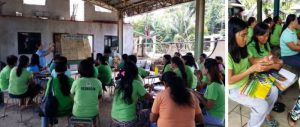“Kwarta sa Basura” project rises in Siquijor
News January 9, 2018, 0 Comment 0
Pantawid Pamilyang Pilipino Program (4Ps) partner-beneficiaries receive lectures on upcycling in their Family Development Sessions (FDS) to create new products which they can sell to have additional means of income.
So it can actively participate in the efforts to reduce pollution and conserve the nation’s resources, the Department of Social Welfare and Development (DSWD), through its Field Office VII, partnered with the Japan International Cooperation Agency (JICA) and the local government of Siquijor to implement the “Kwarta sa Basura” project which aims to upcycle solid waste and turn it to usable materials that can be a source of livelihood for poor families in Barangays Caticugan and Dumanjug, Siquijor.
Through the DSWD Sustainable Livelihood Program’s (SLP) Cash for Building Livelihood Asset for Communal Garden, family beneficiaries of the Pantawid Pamilyang Pilipino Program (4Ps) were able to construct their own Materials Recovery Facility (MRF) to collect garbage and other residual wastes in their community that can be used to upcycle reusable materials such as plastic bottles and cellophane.
Upcycling is a process of transforming waste materials, unwanted products, and other by-products into new or better materials.
The process was introduced by JICA representatives to Pantawid Pamilya partner-beneficiaries in their Family Development Sessions (FDS) to educate them about proper solid waste management, as well as to decrease the volume of waste in their communities.
According to Cheryl Jumamil, a Pantawid Pamilya partner-beneficiary from Brgy. Caticugan, “Dili lang sa economic aspect kini makatabang sa among mga benepisyaryo, paagi usab kini sa pag-minos sa problema sa basura aron mapreserbar ang atong kalikopan (This project would not only help us beneficiaries economically but also helps address the reduction of trash leading to the preservation of our environment).”
Cheryl revealed that she was able to initially earn P20,000 out from selling wallets made from upcycled materials.
“Dako gyud ang ikatabang niining training sa pag-gama og pitaka gamit ang materyales gikan sa basura ilabi na kay ako ra ang nangita sa pagkakaron kay naparalyze man ang akong bana niadtong 2016 (This training on wallet made of trash materials helps us a lot since I am the only one earning a living. My husband has been paralyzed since 2016),” Cheryl said.
Other partner-beneficiaries were also able to sell flower lanterns made of 1.5-liter soft drink plastic bottles and other products such as bags, lanterns, and rugs from discarded materials.
Currently, the municipal government of Siquijor is in the process of procuring construction materials to build a facility to store the upcycled products with the help of the DSWD who will provide other necessary equipment.
Meanwhile, DSWD Officer-in-Charge (OIC) Emmanuel A. Leyco said, “We in the Philippines are very aware of the vast damage brought by climate change to the lives and livelihood of the people so it is important that we help contribute to minimizing its impact by conserving our natural resources that greatly assist us to mitigate the impacts of climate change.”
“The pursuit of development does not only demand economic growth which is based mainly on utilizing the country’s resources. Sustainable development must always be compatible, not only for the benefit of the people but must also respect the planet’s ecological balance,” he added.
OIC Leyco reiterated that the DSWD will further popularize and improve its module on climate change and disaster preparedness ( Topic 3: “Towards a Safe and Prepared Community”) and ensure that it will be widely disseminated and discussed among members of the 4Ps during their FDS, as well as work with the Department of Environment and Natural Resources (DENR) and the Department of the Interior and Local Government (DILG) to educate and empower local communities to take action on climate change. ###